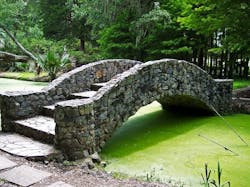Newburyport, Massachusetts may seek damages from a local farmer whose cattle trespassed into the Artichoke Reservoir, allegedly causing a harmful algae bloom.
A cease-and-desist letter was sent to Bruce Colby on Aug. 27, alleging that his cattle trespassing into the reservoir likely resulted in the contamination of the public water supply.
In August an algae bloom was discovered in the Upper and Lower Artichoke reservoirs, according to the Eagle Tribune. The reservoirs are the primary sources of drinking water for Newburyport as well as portions of Newbury and West Newbury.
According to the letter, representatives for the city have seen Colby’s cattle wading in the reservoir and creating conditions which have corrupted or polluted the city’s drinking water. The letter also notes that according to state law, the city is entitled to triple damages if Colby’s cattle contaminated the public water supply, reported the Eagle Tribune.
Since the discovery, the city’s Department of Public Services Water Division has continued to test the water and has not found any toxins. The algae bloom and low-water levels led to a ban on nonessential water use in Newburyport.
According to Dan Wright, a state conservationist for the U.S. Department of Agriculture’s Natural Resources Conservation Service, who would not confirm if Colby’s livestock directly caused the algae bloom, livestock manure is very high in nutrients that can cause algal blooms.
The farmer is required to stop his cattle from trespassing and must install fencing or a barricade that will prevent the cattle from accessing the Artichoke. If the cattle are seen in the reservoir or if the fence has not been installed, the city will take legal action.
The city also required the farmer to provide a timeline for preparing a nutrient management and storm water pollution prevention plan to address runoff from his farmland adjacent to the Artichoke Reservoir, reported the Eagle Tribune. The plan must be submitted to both Newburyport and West Newbury by Oct. 1 so that it can be approved for next year’s algal bloom season, which runs from July through September.
